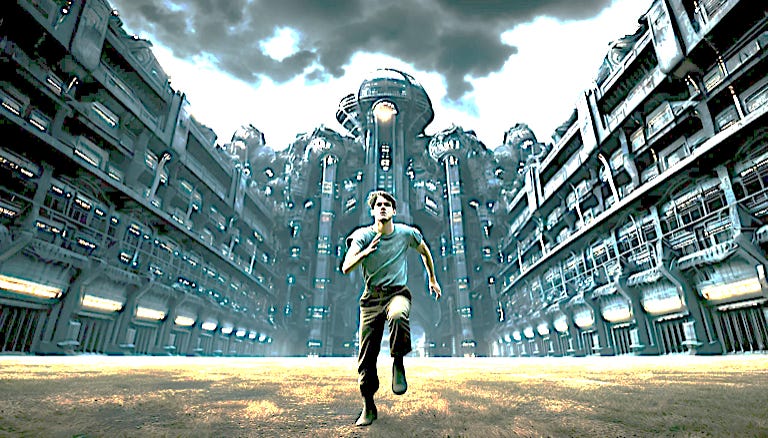Say It Again: Repetition In Harrison Bergeron “Harrison Bergeron”
February 2012 Giem & Collins Award: Research Paper
Repetition, no doubt, is crucial to any story and life in general. Matter of fact, it is the very basis of learning and progress. Experience would be impossible if we could not recognize objects we have experienced in the past.
However, it is useless to have repetition without its companion, difference. If we were to repeat the same thought over and over without difference; we would be equivalent to human metronomes, mechanical devices that function through the eternal return of nature laws. The Newtonian apples that fall to the ground, make no progress in their descent; when viewed strictly with laws of gravity, in mind. On the other hand, evolution progresses by hereditary differences. Mutation, or difference is the source of progress in the living world.
Similarly, society progresses with dynamic events that change the course of human life. One need only consult the definition of revolution, to be sure of this. Established institutions can be overthrown to lead to new ways of life, for better or worse. In understanding institution, it helps to look at a main characteristic of institutions, namely, their reliance on normative concepts of behavior.
The bigger the society, the more it must rely on standards, bell curves, and averages to yield an understanding of the typical life lived by its citizens. This is necessary of society and is in many ways beneficial to society. It is often the case that whole groups of people are subjugated for their nature or beliefs, but thanks to averages and studies combined with the right laws, society can help mediate this tension. Thus, the mark of civilized life is to live within specific standards.
However, the downside is that standards are often the basis for the belief that some people who maintain certain norms are better than those who fall outside the norm. So, difference from the norm can be seen as a bad thing, even if it is the fundamental difference that our nature gives us. In Harrison Bergeron, Kurt Vonnegut takes the interrelated themes of repetition/difference, norms, and progress to the limit when he imagines a society that has made difference obsolete.
The competitive spirit aroused when two people of different capacities compete is nowhere to be seen. Nowhere do superiors push inferiors to their limits. With no pressure to overcome obstacles, no change can happen. Nothing new is possible. It will be seen that the society Kurt Vonnegut describes through the repetitive use of plot, dialogue, and narration is incapable of making progress; due to its neutralization of individual differences and dynamic events——leaving only mere repetition of the same.
The paper will support this first by analyzing the narration, which is mainly in the past tense; however, it has a few important uses of the present tense. Then, it will describe the redundancy found in the plot, indicating the vicious circularity that surrounds the story and its characters. It will end with an analysis of the dialogue of Hazel, showing the uneventful discourse that characterizes the whole community.
Kurt begins the story almost as an afterthought, “The year was 2081, and everybody was finally equal”. The narration is in the third person omniscient perspective. This is fortunate because the characters have poor working memory to say the least.
In the description of the main character he says, “Hazel had a perfectly average intelligence... she couldn’t think about anything except for in short burst... George, while his intelligence was way above normal, had a little mental handicap radio in his ear”. These are just a few instances of the use of past tense.
This choice in formal structure seems to do a few things in the story. One, the past tense situates the story in a world that is no longer susceptible to change. All actions have already been done with varying completeness. The last line of the story stands by this, “There was the sound of a riveting gun in his head”.
Still in the past, it has the feel of a tragic story being retold. Even if the account came only shortly after the event of the sound, it happens in a world where you can no longer coincide with the immediate present, or gaze into the future. Thus, the power of change is precluded by this narrative element.
However, some of the dialogue is in the present tense. One important passage said by Harrison Bergeron gives hope for progress, “I am a greater ruler than any man who ever lived! Now watch me become what I can become”. No were else does Kurt use “become” and “can” with such affirmation.
More importantly, this juxtaposition of tense mirrors society on the whole. George and Hazel are weighed down by their handicaps, some are natural, and some are artificial. They are simply normal. Even their present tense dialogue rings of fate already complete. There is no room for them to become something other than normal; that would be against the law.
On the repetition of however, Harrison’s strong affirmation of becoming signals a break in the story, which attempts to create something new in the plot and the society. He is trying to make progress. He is also claiming to be better than normal, and he is doing it in the present with a gaze toward future.
Unfortunately, his reign is short lived when the narrator informs us that:
“Diana Moon Glampers... came into the room with a double-barreled shotgun. She fired twice, and the Emperor and Empress were dead”.
The only thing that follows the dynamic affirmation of Harrison is more past tense and static dialogue. The lack of progress made by the characters and the world they live in is easier to see when considering the structure of the plot.
It begins with George and Hazel sitting and watching TV. It is unusual though because “there were tears on Hazel’s cheeks, but she’d forgotten for the moment what they were about”.
This forgetfulness of previous events in the plot is common throughout the story. After some dialogue, and while watching the ballerinas on TV, a news bulletin announces the escape of Harrison Bergeron. It states:
“[he] has just escaped from jail, where he was held on suspicion of plotting to over through the government. He is a genius and an athlete, is under-handicapped, and should be regarded as extremely dangerous”.
Harrison is stronger and smarter than everyone else and since the society is based on making everyone equal, he is a threat to the norm. The fact that he is an athlete only makes things worse by signaling his competitive nature.
His presence in the story soon becomes the focus, as he rips off his handicaps and takes a bride. As they display their natural powers, they attempted to kiss the ceiling of the room; then,
“Neutralizing gravity with love and pure will, they remained suspended in air inches below the ceiling”.
The simultaneous breaking of human law and natural law is surely significant. This is the pinnacle of progress; two humans have become god-like. Most other societies would praise this event as a new era in human evolution.
However, in the anti-climatic society that Kurt describes, it is soon forgotten. The plot repeats itself, making no progress at all; again and again. The world stays completely static and unmoved by this miracle. This is indicated by the following passage:
And then he sat down again, ‘You’ve been crying?’ he said to Hazel. ‘Yup” she said. “What about?” he said. ‘I forgot’ she said.
This theme of repetition without progress is seen again in Kurt’s use of dialogue. Hazel utters a statement that is seen three times in the story: one time at the beginning, and two times at the end. It is in response to the sound that goes off in George’s ear when he thinks of something. She comments on this event no less than 5 times, throughout the story. She exclaims “that was a doozy, wasn’t it”.
This is short lived and quickly forgotten when a few lines later she is shocked at George’s paleness and trembling, which was caused by the doozy she just mentioned. Her character is a crucial element in the story. She, herself, does not appear to have any handicaps. She was born with “average intelligence”. Given that this society seeks to reduce everything to the standard, she indicates the intelligence of the society as a whole. Thus, her static character is a reflection of a static society.
And the last lines close the vicious circle of “Harrison Bergeron”:
’Gee—I could tell that one was a doozy,’ said Hazel. ‘You can say that again,’ said George. ‘Gee—‘ said Hazel, ‘I could tell that one was a doozy’.
Thus, Kurt’s story finishes exactly where it began, with a teary faced Hazel who is forever repeating herself in a static world. Since, she is the representation of intelligence; her dialogue represents the discourse of the populace, en masse, indicating a speech closed in on itself.
The story is anti-climactic for the characters, which have no memory of the events. Anything against the norm, like dynamic events, are against the law. The plot shows that any new emergence in this world deviates from what is and must answer to a double barrel-shotgun.
Thus, this world precludes the ability to make progress by systematically eliminating difference.
Only static events are repeated in a world without memory. The narrator saw the only potential affirmation of becoming, and even this is given as after the fact.1
Me not being there to receive the award. Around this time, I was the President of Philosophy Circle; and hosting an undergraduate philosophy conference at Rhodes College. Starts at 11:50










